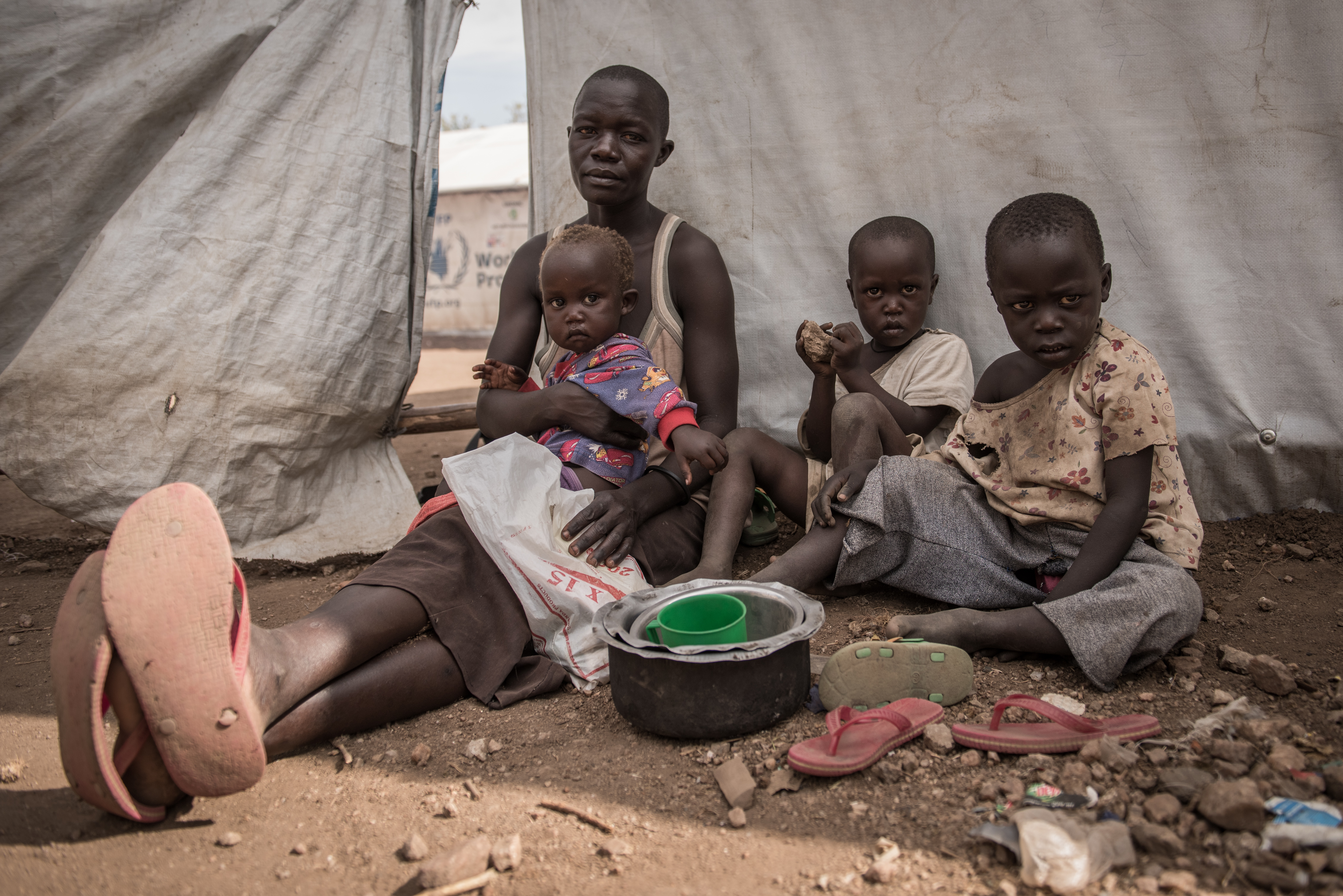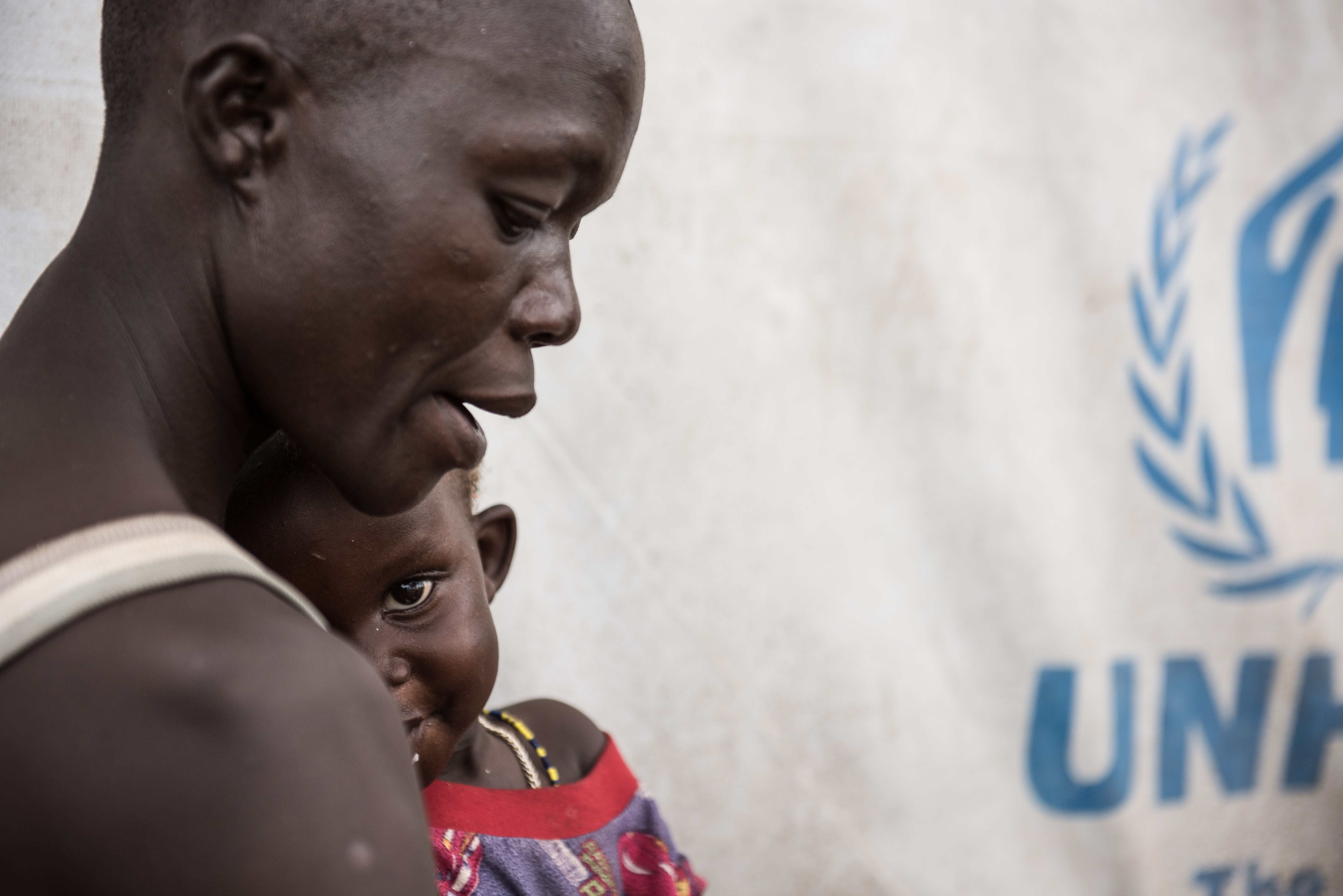Serving hope, one hot meal at a time

One and a half year old Sumaya tries to feed on her mother's milk. Her mother Amandru gently pulls little Sumaya's mouth away from her breast again. Her breasts are empty. It has been more than seven days since she was last able to breastfeed Sumaya.
You can see from her face that Amandru is tired. Physically, mentally, emotionally. A blank expression on her face, she stares through the crowd of children, women and men holding pans in their hands, waiting to receive their meal. With not much strength left to wait in the long queue, Amandru and her three children rest on the side of the tent where the meals are being served. World Vision in partnership with the World Food Programme (WFP) serves hot meals to refugees who arrive at various border points into Uganda.
This is the first proper meal Amandru and her children will eat in weeks.
Amandru fled from her village near Yei in South Sudan, more than 220 kilometers away from the Ugandan border district of Arua, where the refugee reception centre has been set up. Amandru and her children reached Uganda after about four weeks of walking.
When fresh violence broke out in South Sudan in July 2016, Amandru's husband a Boda-Boda [a motorcycle used as a taxi] driver was shot dead. She was out in the field working on the land, when she heard the news of her husband's death from someone in her village, who saw her husband's body lying on the road. "Many people were being killed every day. With my husband too shot dead, I was scared to stay in the village. I went and hid in the bushes with my children. A few days later my house was completely burned down", recalls Amandru.
Amandru set up a makeshift hut in the bushes. However, she, little Sumaya and the other two children Ariye (4) and Madasi (6) had to survive, eating just once in two days for many months. "I had some beans that I carried along with me when we fled. But every day I was worried that the beans would get over and we would have nothing left to eat. So we started eating only one meal a day for a few weeks and many days ate just once every two days", said Amandru.
Sometimes Amandru would go back to her farm just to get some sweet potatoes from their land. "But it was unsafe and scary. I saw slaughtered bodies. Not shot. Slaughtered", she says. "They had even started slaughtering children".
When finding food became such a challenge, and many of the people hiding in the bushes started leaving, Amandru too decided to cross into Uganda.
For over four weeks Amandru and her three children walked every single day from morning till night. "The children are still small, so we had to rest six or seven times every day", she said, gently rubbing little Sumaya's dusty hair.
The entire four weeks journey, Amandru and her children survived eating only peanuts, the four of them sharing just one handful of peanuts per day.
Today, they will eat their first hot meal in a long time.
Amadru's body language changed as soon as World Vision staff offered to help get the meals for her. The four of them sat down near the tent, little Sumaya on her mother's lap. The children were eager to start eating, but Amandru made sure the three children washed their hands before they touched the food.
The four of them ate their meals. Their faces brightened. They were smiling.
Amandru and her three children are staying at the Imvepi reception centre in Arua district, Uganda. Imvepi was established on March 17, 2017. As per the latest data, the number of South Sudanese refugees in Uganda stands at 769,175. More than 518,000 have arrived in the last eight months alone, averaging at a little over 2,000 South Sudanese refugees every single day.
The United Nations High Commission for Refugees recently announced the South Sudan refugee crisis to be the fastest growing emergency in the world right now. Tens of thousands of families like Amandru's are fleeing their homes to escape fighting, violence and food insecurity.
World Vision Uganda, the lead partner of the World Food Programme, has been distributing hot meals and monthly food supplies to refugees in Yumbe, Adjumani, Arua, Moyo and Koboko districts.
As for Amandru and her children, the simple hot meal at the reception centre has put a smile back on their faces. However, the desire to rebuild a peaceful life for her children rests on the hope that the world will stand by her.
Authored by Theodore Sam, Communications Manager


